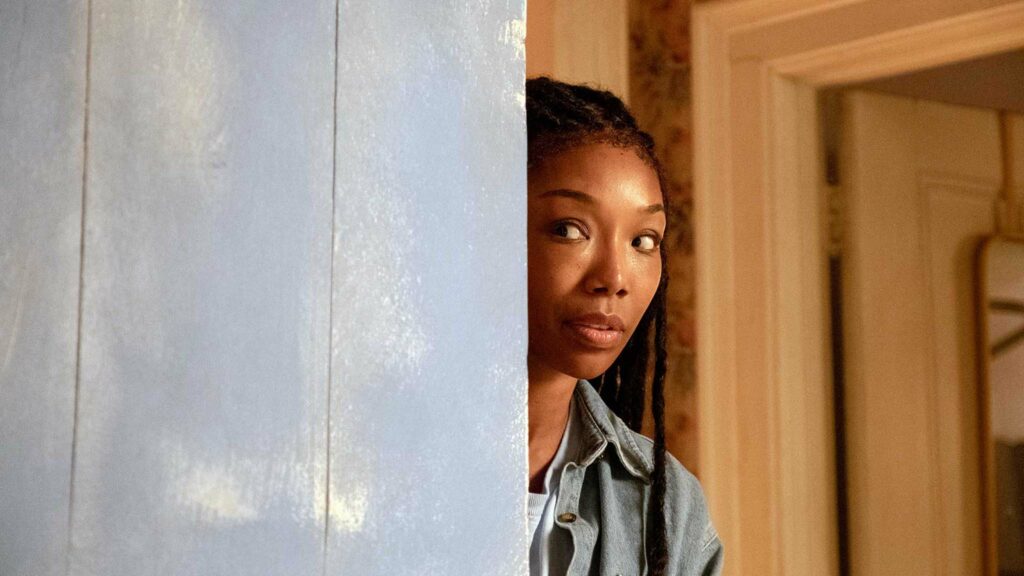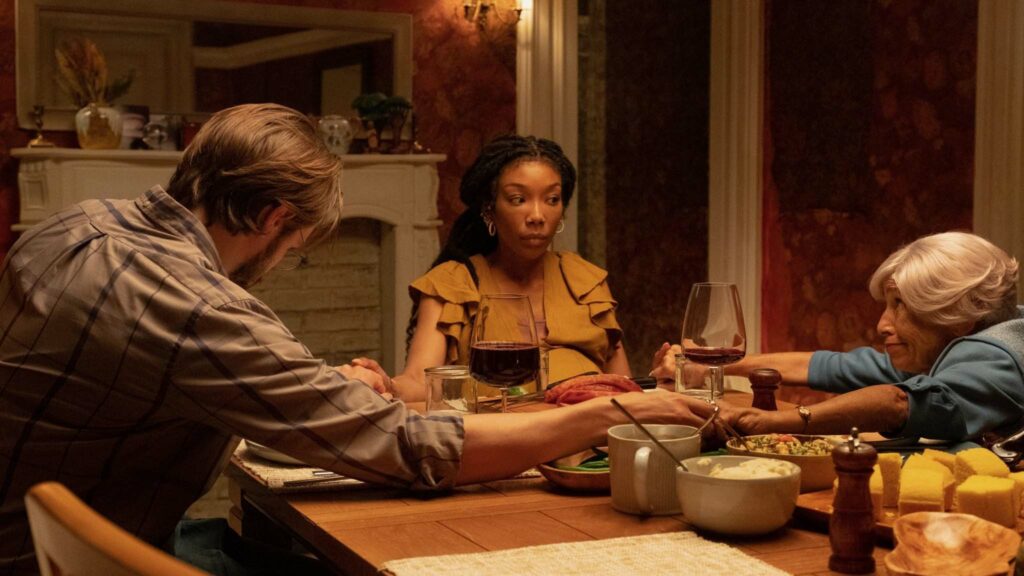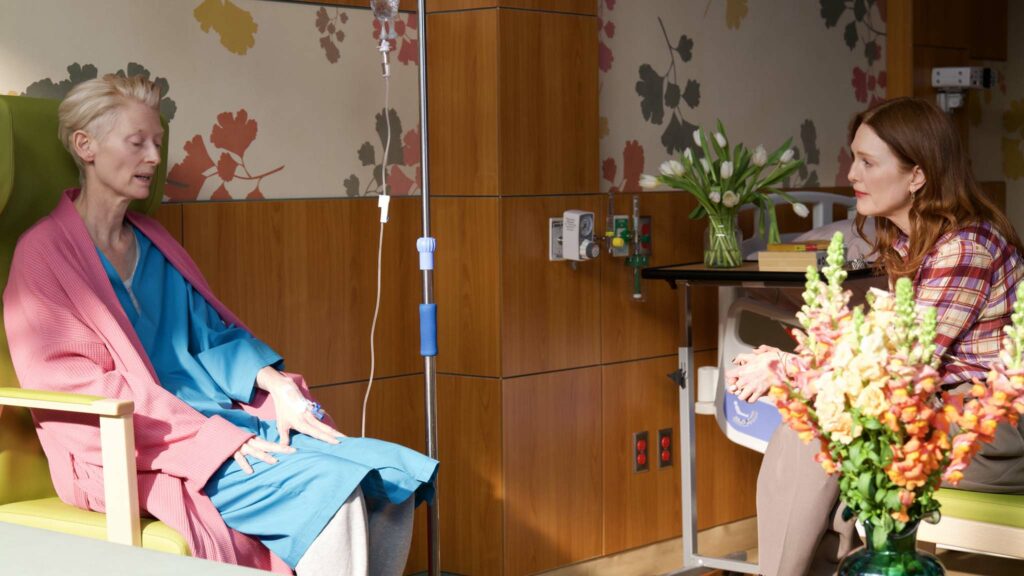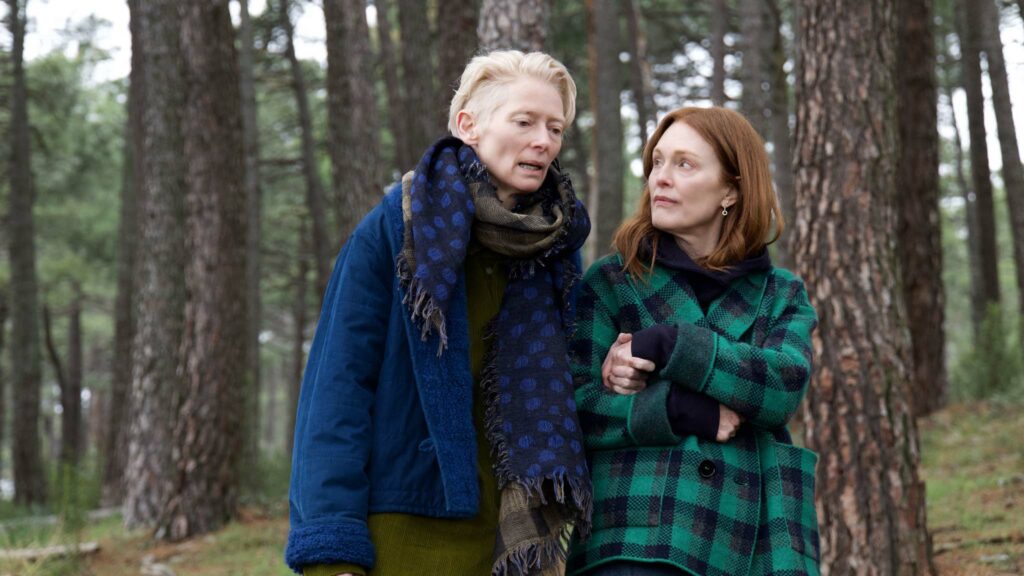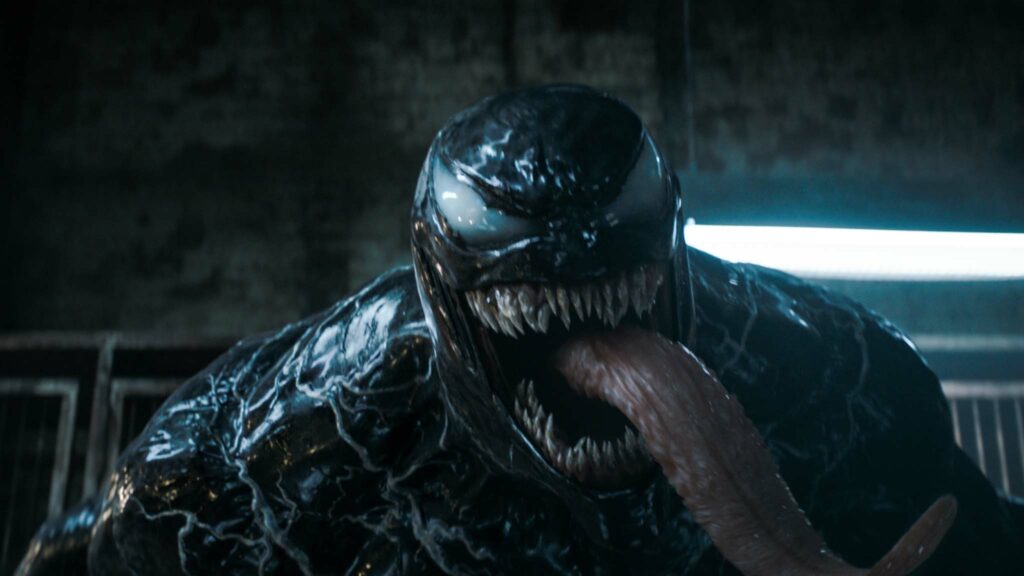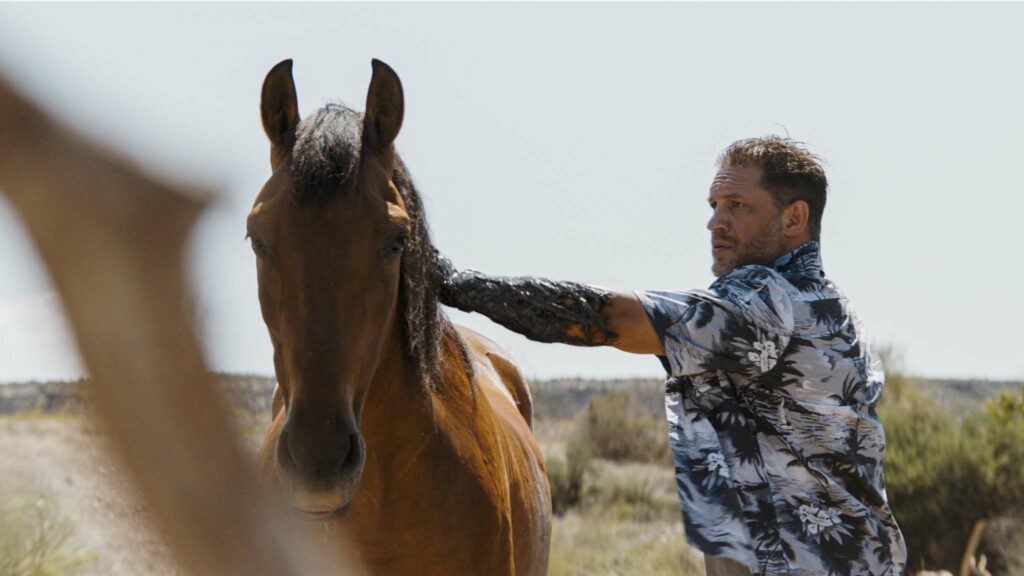Thriller
The Front Room (15)
Review: Caring for the elderly by younger members of a family unit is considered as an honour, not just a moral responsibility, in some cultures, notably those which adhere to the teachings of Chinese philosopher Confucius, who promoted empathy and compassion on a journey through life where old age should be revered as a glorious culmination. Even the most devoted daughter and son would struggle to bear the weight of the horrors that writer-director brothers Max and Sam Eggers pile upon their beleaguered characters in this nightmarish home invasion thriller.
Based on a short story penned by North Yorkshire-born author Susan Hill, best known for The Woman In Black, The Front Room pits a heavily pregnant wife and emotionally scarred husband against the stepmother from hell, portrayed with lip-smacking gusto by Kathryn Hunter. Her performance as a manipulative harpy with two walking sticks, who self-mutilates then blames her injuries on her carers, teeters on the edge of camp grotesquerie from the moment Hunter’s wide-eyed stare emerges from behind a funereal veil. The theatrical villainy enlivens an otherwise dull and pedestrian battle of wills between conflicted generations.
If you’ve ever contemplated how much waste a human body can produce in 24 hours, the Eggers provide graphic answers throughout The Front Room. They smear the screen and an increasingly claustrophobic central location with bodily fluids ad nauseum. Familial carers cover their noses, gag, retch and wince in pain. The greatest waste, however, turns out to be a solid ensemble cast trapped in a humdrum, Rosemary’s Baby-lite story of twisted religious fervour with one inevitable conclusion.
Government-appointed lawyer Norman (Andrew Burnap) attends the funeral of his estranged father with heavily pregnant wife Belinda (Brandy Norwood). The couple are still grieving a stillborn son and are anxiously preparing to welcome a daughter into the world. After the funeral service, Norman’s Bible-spouting stepmother Solange (Hunter) offers to sign over her sizable estate to the cash-strapped couple if they allow her to move into their home and care for her.
At Belinda’s insistence, Norman accepts and Solange installs herself in the freshly decorated front room, which was supposed to be a nursery. Using the inheritance as a bargaining chip, Solange wields an insidious influence over the dangerously divided household and Belinda is propelled to the verge of a nervous breakdown tending to everyone but herself.
The Front Room plays out its psychological battle of wills without a sense of urgency, heaping misery on Belinda and Norman until their marriage buckles. Norwood’s new mother retains our sympathy, especially when Burnap’s weak-willed spouse abandons her for extended periods in service of the flimsy plot. She is no match for Hunter’s attention-grabbing harridan, who heralds each demonstration of incontinence by loudly screaming “M, E, S, Sssssss.” She’s a shrewd and fair critic of the Eggers’ picture.
Find The Front Room in the cinemas
Animation
Rebellious (PG)
Review: The pen is mightier than an enchanted sword in the fantastical computer-animated adventure Rebellious. Subtitled Mission Royal Rescue, the latest wholesome yarn from filmmaker Alex Tsitsilin, director of the Frozen-lite Snow Queen franchise, elevates a sensitive young man with a passion for reading to a swashbuckling saviour of kidnapped princesses by virtue of his knowledge of the laws of physics. “I read about them in my architecture books,” proudly beams the dreamboat to an accomplice as he applies mathematical theories to the construction of a catapult to target the weak spot of a dam and flood an arid valley.
Animated Disney princesses have been a clear influence on Tsitsilin’s earlier work and the inspiration continues here. Culturally diverse damsels abducted in an opening storybook montage are modelled on Rapunzel, Sleeping Beauty and Snow White and other protagonists bear striking resemblances to Jasmine from Aladdin and Tiger Lily from Peter Pan. A facially expressive white horse, ridden by the bookworm beau, shares a stable with Maximus from Tangled.
Scriptwriters Analisa LaBianco and Jeffery Spencer insist on spelling out characters’ internal thoughts and every pedestrian step of the plot in expository dialogue. Thus, the strapping bibliophile loudly voices his distress about being separated from his unnaturally small-waisted fiancee (“Losing the girl you love to a maniacal sorcerer is a fate worse than death!”) and the same hunk remarks aloud on the resilience of Mother Nature as lush green flora visibly sprouts around him.
Headstrong and outspoken Princess Mina (voiced by Alyson Leigh Rosenfeld) has been raised by her father, the King (David Wills), on superstitious tales of an evil sorcerer named Kezabor (Pete Zarustica), whose terrifying dragon snatches unmarried girls of royal heritage from their chambers. Mina has little time for folklore or outdated patriarchal traditions such as her father choosing her a husband from three potential suitors, Rogdai (Matt Giroveanu), Kabir (Anthony Sardinha) and Fa Chan (Brian Kim).
“I want to lead the kingdom and be with the man I love,” coos the princess shortly before she accepts a bungled marriage proposal from bookworm best friend Ronan (Dan Edwards). The King ultimately gives his blessing to their nuptials but Kezabor’s dragon Nahina (Vanessa Johansson) materialises on the wedding day to spirit Mina away. The King promises his daughter’s hand to her rescuer and the three suitors mount trusty steeds while Ronan heads on foot into the Impassable Forest.
Contrary to its title, Rebellious politely submits to fairy tale conventions and follows the recent trend of spirited princesses, who problem-solve their own salvation rather than waiting for a dashing prince. Visuals are richer and more detailed than the linear storytelling, which leaves nothing to personal interpretation or inference. Tsitsilin’s picture delivers a moderately happy ever after.
Find Rebellious in the cinemas
Drama
The Room Next Door (12A)
Review: I have been a gushing admirer of Spanish auteur Pedro Almodovar’s work since the sexually charged delirium of Women On The Verge Of A Nervous Breakdown gate-crashed my teenage years. All About My Mother and Talk To Her both merited glowing five-star reviews and ranked in my top 10 films of their respective years, and the most recent pictures, Pain And Glory and Parallel Mothers, have been terrific, continuing the filmmaker’s on-screen love affairs with long-running collaborators Antonio Banderas and Penelope Cruz.
So, it is with an incredibly heavy heart that I must concede The Room Next Door is among my least favourite Almodovar pictures. His first full-length feature shot entirely in the English language draws inspiration from Sigrid Nunez’s novel What Are You Going Through to navigate the divisive issue of euthanasia through the eyes of two female friends. The Room Next Door unfolds as a heightened melodrama and provides Tilda Swinton with an eye-catching central role as a former war correspondent, resigned to the tightening grip of inoperable stage three cervical cancer. Julianne Moore plays her morally conflicted gal pal and travelling companion on the journey towards eternal slumber.
So much potential brilliance on screen and behind the camera but something vital, an emotional connection to characters in crisis, is lost in translation from Spanish to English and left me feeling crushingly disappointed. Almodovar’s scripts are usually so nimble and spry but here, portentous dialogue (“There are lots of ways to live inside tragedy”) limps from trembling lips and draws attention to disparate, mannered performances that elicit tears from the two leads. I was strangely unmoved.
“I think I deserve a good death,” Martha (Swinton) coolly informs author friend Ingrid (Moore), outlining a plan to spend her final weeks in a rented property near Woodstock with a euthanasia pill obtained illegally on the dark web. While Martha awkwardly articulates her desire to stay in control (“Cancer can’t get me if I get me first”), a distraught but compliant Ingrid seeks comfort in the company of mutual old flame Damian (John Turturro), who likens his energetic bedroom antics with Martha to “having sex with a terrorist”.
The Room Next Door kept me at arm’s length from vital conversations about the humane termination of life on request. Swinton and Moore are compelling but they are trapped in their respective orbits with no visible gravitational pull towards each other. “Can I tell your story?” Ingrid asks Martha at one point. “You can do what you want, I won’t be here,” she sombrely replies. Almodovar does what he wants with the women’s tangled stories and, lamentably, I was there to witness it.
Find The Room Next Door in the cinemas
Action
Venom: The Last Dance (15)
Review: Indiana Jones And The Last Crusade, Toy Story 3 and The Bourne Ultimatum each concluded on a giddy high… until greed demanded the franchises overextend with disappointing additional instalments including a fifth hoorah for Woody and Buzz earmarked for summer 2026. The third and supposedly final chapter of the Venom saga set in the same Marvel Comics universe as Tom Holland’s friendly neighbourhood Spider-Man is (marginally) the best of the special effects-laden bunch and marks the feature directorial debut of screenwriter Kelly Marcel. A ramshackle plot formally introduces a new Thanos-level supervillain to the Marvel Cinematic Universe to sever the bond between Tom Hardy’s reluctant hero and his symbiote partner-in-crime, whose antagonistic relationship has been an enduring highlight of the series.
The symbiote’s potty-mouthed inner dialogue is a reliable source of comic relief and Marcel elicits giggles from Venom’s attempts to make a cocktail, dole out rough justice to members of a dog-fighting ring or gamble for the first time in a crowded Las Vegas casino. Superfluous to dramatic requirements, but fleeting fun nonetheless, Venom also gets to groove in a hotel penthouse with convenience store owner Mrs Chen (Peggy Lu). Laughs are shoe-horned into the scattershot narrative framework of a road trip down the Extraterrestrial Highway towards Area 51 in the company of a UFO obsessive (Rhys Ifans) and his campervan clan.
When we first re-encounter investigative journalist Eddie Brock (Hardy) and Venom, they are lying low in Mexico City, on the run from authorities for the murder of detective Patrick Mulligan (Stephen Graham). The cop and his bonded symbiote Toxin are alive, under the observation of Dr Payne (Juno Temple) at the Imperium symbiote containment programme located 100 feet beneath the subsurface of the highly classified Area 51 US Air Force facility in the Nevada desert.
Puny humans are blissfully unaware that the symbiotes’ immortal creator, god of darkness Knull (Andy Serkis), has dispatched xenophage hunters to locate Venom’s hidden power source, the Codex, which can set Knull free to terrorise the multiverse. Military commander Rex Strickland (Chiwetel Ejiofor) learns of the cataclysmic threat and vows to kill Eddie, thereby destroying the Codex.
Venom: The Last Dance is an unapologetically noisy swansong, replete with two additional scenes secreted in the end credits. The xenophage hunters are strikingly similar to HR Giger’s Alien queens, albeit with rotating rows of razor-sharp teeth that shred victims and expel chopped remains out the back of the creatures’ heads like a woodchipper. Hardy is a beleaguered, sweaty mess for most of the film until he’s called upon to be a willing accomplice to Marcel’s script as it gently plucks heartstrings. Teary eyes almost feel deserved with a sombre final sway.
Find Venom: The Last Dance in the cinemas


